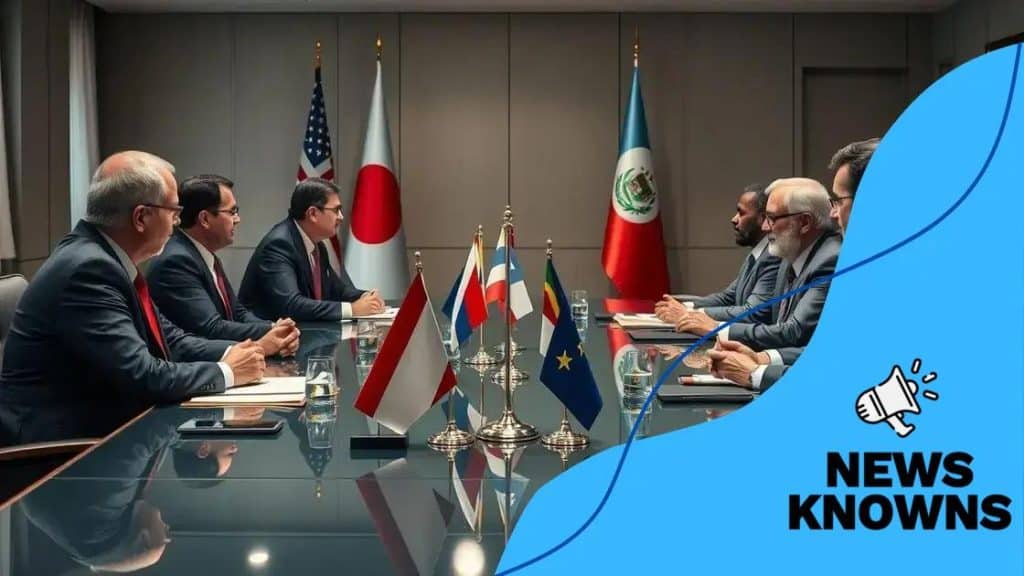US-Russia peace talks mediation: a path to stability

Anúncios
US-Russia peace talks mediation aims to reduce tensions, foster cooperation, and improve global stability, leveraging international organizations to facilitate dialogue and monitor compliance for lasting resolution.
US-Russia peace talks mediation could be crucial in redefining international relations. Have you thought about the stakes involved for both nations? Let’s delve into how this process could shape our world.
Anúncios
Historical context of US-Russia relations
The historical context of US-Russia relations is essential for understanding the current dynamics between these two powerful nations. Their journey has been filled with both cooperation and conflict. From World War II allies to Cold War adversaries, the landscape has dramatically evolved.
The Cold War Era
During the Cold War, the US and Russia were in a constant state of tension. This period was marked by a nuclear arms race and ideological battles. Major events like the Cuban Missile Crisis highlighted the risks involved in these rivalries.
Post-Cold War Relations
After the Cold War ended, there was a brief moment of optimism for peace. The US and Russia engaged in various treaties aimed at reducing nuclear weapons and enhancing collaboration. However, challenges quickly arose, leading to new conflicts.
Anúncios
- The expansion of NATO towards Eastern Europe.
- US interventions in the Balkans.
- Economic sanctions imposed by the West.
These events have created a sense of mistrust and resulted in a more adversarial relationship. Recently, issues like cyber warfare and geopolitical tensions in regions like Ukraine have further strained these ties.
The impact of historical events continues to shape the relations today. Many analysts believe that resolving these issues requires revisiting past agreements and understanding how both nations perceive their interests.
Key players in peace talks mediation
Understanding the key players in peace talks mediation is vital to grasp the ongoing discussions between the US and Russia. These individuals and organizations play crucial roles in guiding negotiations and fostering dialogue.
Government Officials
Representatives from both nations bring diverse perspectives to the table. The US Secretary of State and Russian Foreign Minister are pivotal figures in these discussions. Their diplomatic skills are essential for addressing complex issues and finding common ground.
International Organizations
Organizations like the United Nations and Organization for Security and Co-operation in Europe (OSCE) often facilitate these talks. They provide a neutral ground and help ensure that both parties adhere to international law.
- UN aids in maintaining peace through resolutions.
- OSCE monitors compliance with agreements.
- Both organizations promote dialogue and understanding.
Moreover, non-governmental organizations (NGOs) also play significant roles. They often act as mediators and bring public perspectives into the negotiations. By doing so, they raise awareness and advocate for the needs of affected communities.
The involvement of historical figures in diplomacy also shapes the process. Past leaders who have successfully navigated peace talks offer valuable insights and lessons. Their experiences can influence current negotiations and inspire current leaders to pursue constructive dialogue.
Challenges faced in negotiations

Negotiating peace is rarely straightforward, and the challenges faced in negotiations between the US and Russia often complicate the process. Understanding these obstacles is crucial for grasping the intricacies of diplomacy.
Trust Issues
One of the biggest hurdles is rebuilding trust. Years of tension and conflict have led to deep mistrust between the nations. Each side often fears the other may not honor agreements, making open dialogue difficult.
Competing National Interests
Another significant challenge arises from competing interests of both nations. The US and Russia prioritize different goals in global politics, which can lead to disagreements in negotiations. Issues like military presence in certain regions or foreign alliances often clash.
- Military interventions in neighboring countries.
- Economic sanctions affecting trade.
- Disparities in political ideologies.
Additionally, external factors play a critical role. Domestic pressures from political parties and public opinion can influence how negotiators approach talks. Leaders in both countries must balance international relations while satisfying their constituents.
Moreover, communication barriers can create misunderstandings. Differences in language, culture, and diplomatic style complicate the effectiveness of negotiations. Misinterpretations can escalate tensions rather than resolve them, having severe implications for peace talks.
The role of international organizations
The role of international organizations is pivotal in the context of US-Russia peace talks. These organizations serve as mediators, facilitators, and platforms for discussion. They help bridge gaps between conflicting parties and promote dialogue.
Facilitating Dialogue
Organizations like the United Nations (UN) and the Organization for Security and Co-operation in Europe (OSCE) are crucial in this process. They create neutral environments for talks and ensure that all voices are heard. Without such platforms, negotiations could easily break down due to heightened tensions.
Monitoring Compliance
Another significant function of these organizations is monitoring compliance with agreements. They are tasked with ensuring that both sides adhere to the terms set during negotiations. This monitoring fosters accountability and builds trust.
- The UN can deploy peacekeeping forces to maintain order.
- OSCE observers can report on the ground situation, ensuring transparency.
- These organizations can mediate disputes and propose solutions.
Moreover, international organizations also provide valuable resources. They offer expert advice and technical assistance to enhance negotiations. These resources are vital for effective conflict resolution.
Additionally, they can apply international pressure when necessary. If one side is not cooperating, these organizations can rally support from other nations, encouraging compliance.
Future implications of successful mediation
The future implications of successful mediation in US-Russia peace talks can shape global stability and international relations. When peace is achieved, the benefits extend beyond just the two nations involved.
Strengthening International Relations
Successful mediation can lead to stronger ties between countries. This outcome encourages cooperation and mutual understanding, fostering a collaborative environment. As nations work together more closely, they can address global challenges like climate change or terrorism.
Economic Benefits
Furthermore, achieving peace often opens doors for economic collaboration. Trade agreements can flourish when tensions decrease. Countries may invest in each other’s economies, leading to job creation and prosperity.
- Increased trade and investment opportunities.
- Joint initiatives in technology and innovation.
- Shared resources for economic growth.
The potential for reduced military spending also arises. Nations may redirect funds typically allocated to defense into social programs and infrastructure development, fostering better living conditions for their citizens.
Additionally, the success of peace talks can inspire other regions facing conflict. Countries around the world may look to US-Russia negotiations as a blueprint for their mediation efforts. This ripple effect can promote a more peaceful global environment, enhancing diplomatic practices.
Conclusion: Successful mediation in US-Russia peace talks can lead to significant positive changes. When these nations find common ground, it can strengthen relationships globally, inspire cooperation in other regions, and boost economic growth. Additionally, less military spending means more resources for improving lives. Ultimately, the efforts to mediate peace with the help of international organizations can create a more stable and united world for everyone.
FAQ – Frequently Asked Questions about US-Russia Peace Talks Mediation
What are the main goals of US-Russia peace talks?
The main goals include reducing tensions, fostering cooperation, and addressing global challenges together.
How do international organizations help in mediation?
International organizations provide neutral ground, facilitate dialogue, and ensure that agreements are monitored and respected.
What challenges do negotiators face during peace talks?
Negotiators often deal with trust issues, competing national interests, and communication barriers.
What are the potential benefits of successful mediation?
Successful mediation can lead to strengthened international relations, economic growth, and reduced military spending, contributing to a more stable world.





